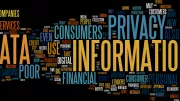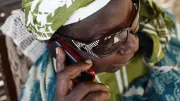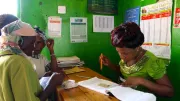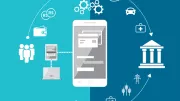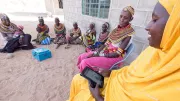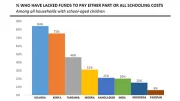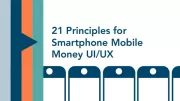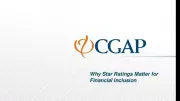Recent Blogs
Blog
Digital Financial Inclusion Supervision: Tanzania Pilot Program
The world of digital financial inclusion is growing quickly and outpacing capacity and resources to tackle it from a regulatory and supervisory standpoint. In response, CGAP and Toronto Centre piloted the first Digital Financial Inclusion Supervision training program in Tanzania.Blog
Six Tips for Policy on Disruptive Digital Financial Inclusion
Digital technologies are changing the financial inclusion landscape worldwide by revolutionizing access to finance, connecting hundreds of millions to formal financial services for the first time. Financial market regulators, supervisors and overseers are racing to keep pace with these developments.Blog
Making the Case for Privacy for the Poor
Poor people in emerging economies are rightfully concerned about whether their families are safe, sheltered and adequately nourished. Where does privacy fit into that mix?Blog
Digital Finance in WAEMU: What’s New?
CGAP recently interviewed representatives of 100+ organizations in Benin, Côte d’Ivoire, Senegal, Mali and Niger to better understand the market system for digital financial services in the West African Economic and Monetary Union (WAEMU). What have we learned?Blog
503.2 Million Reasons to Tackle Data Protection Now
Conducting financial affairs digitally does not come without risks, evidenced by recent privacy breaches around the world. CGAP is exploring relevant issues in data protection, along with potential solutions that could build trust and improve value for customers, providers and societies.Blog
Future of Mobile Money for Cocoa Farmers in Côte d’Ivoire, Ghana
New research from the World Cocoa Foundation explores the potential of mobile money to enhance cocoa farmers’ livelihoods in Côte d’Ivoire and Ghana and paints a detailed persona of customers at the frontier of widespread adoption.Blog
Kenya Ends Hidden Costs for Digital Financial Services
In Kenya, many digital financial service providers do not disclose to consumers the costs of products. On October 29, the Competition Authority of Kenya announced an important new standard for pricing in digital financial services.Blog
Advancing Financial Inclusion Through P2G Payment Digitization
Karandaaz Pakistan recently undertook the first-ever systematic review of digital person-to-government (P2G) payment efforts from across the globe. What did they find, and what are the implications for future P2G digitization efforts?Blog
Time to Take Data Privacy Concerns Seriously in Digital Lending
Digital credit is on the rise in Kenya. While digital lenders are expanding access to credit for many Kenyans, they are operating outside regulation by any financial sector authority–and some key consumer protection concerns have started to emerge.Blog
How BOMA Is Using Technology to Reach the Extreme Poor
In 2013, the BOMA Project started moving to a digital data collection system for its programs in Kenya. This system has made data collection less costly, more timely and more reliable, with greater accountability translating into improved results for program participants.Blog
Wave Money Myanmar: The Power of Smartphone Design
Myanmar has experienced remarkable growth in smartphone penetration compared to other frontier markets. A partnership between Wave Money, CGAP and Small Surfaces is leveraging human-centered design to build a digital finance app, seeking to capitalize on this opportunity to reach the unbanked.Blog
Emerging Opportunities for Digital Finance in Indonesia
The recent visit to Indonesia by the UN Secretary-General’s Special Advocate for Inclusive Finance for Development (UNSGSA)–H.M. Queen Máxima of the Netherlands–provided a unique opportunity to better understand key accomplishments, challenges and opportunities for financial inclusion in the country.Blog
Paying for School: 6 Insights for Better Financial Services
The inability to pay fees and other education expenses keeps many children out of school. What is the extent of these challenges, who is affected and what kinds of financial services could help?Blog
Why We Need to Start Talking about Operational Inefficiencies
To contribute to sustainable development, microfinance itself must be sustainable. Many microlenders–including mature and/or highly profitable ones–still have ample capacity for significant efficiency gains, yet efficiency considerations are usually not among their top concerns. Why?Blog
The Power of Smartphone Interfaces for Mobile Money
An initial set of 21 principles for the design of smartphone interfaces and mobile money has been released. This powerful new area of research can harness the power of smartphones to better serve the poor.Blog
How Financial Inclusion Can Boost a Nation’s Health & Well-Being
Low-income households often struggle with health expenses, and inadequate access to quality health care can drive families into poverty. To achieve good health and well-being, UN Sustainable Development Goal 3, financial inclusion can and should play a critical role.Blog
Digital Credit in Kenya: Time for Celebration or Concern?
There are now more than 20 digital credit offerings in Kenya, with new services launching continually. Hype is building around the potential opportunities these products could bring, but their rapid proliferation is also raising questions about risks.Blog
Delivering on Education for All: The Role of Mobile Money
For many low-income families worldwide, education can be out of reach. Mobile money and digital financial services have the potential to help families by providing them with better tools that can help them save, plan and make education payments.Blog
Digital Social Payments in India: Can the Challenges Be Overcome?
Envisioned as a digital revolution for government transfers, India's Direct Benefit Transfer program transfers government benefits into recipients' bank accounts. Three years in, the government continues to face challenges in digitizing transfers. Is there a way forward?Blog



